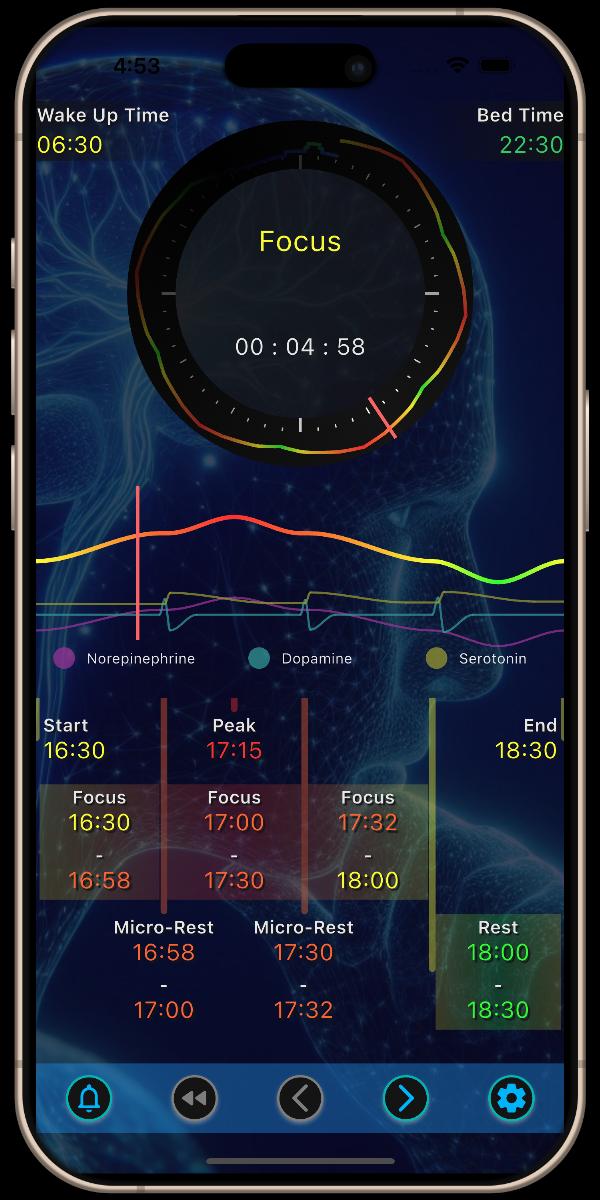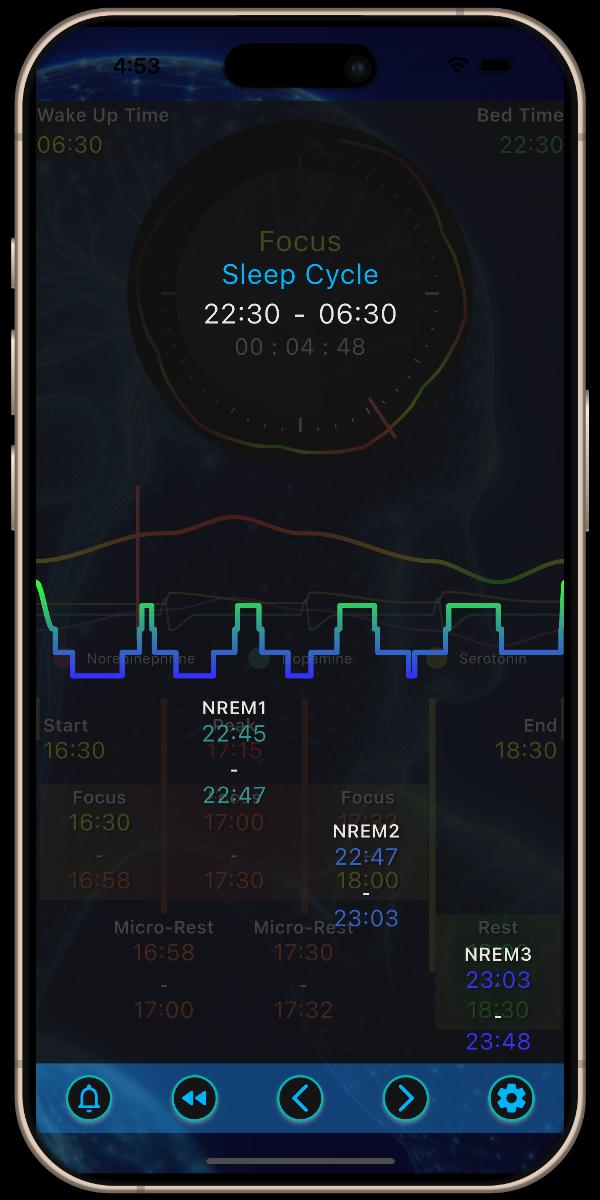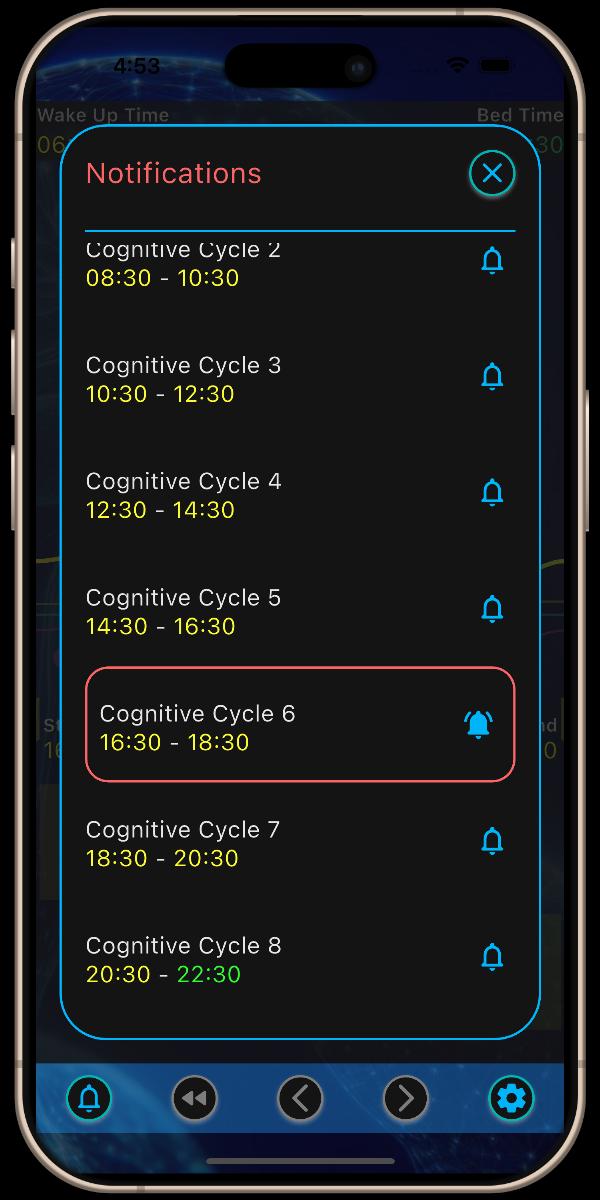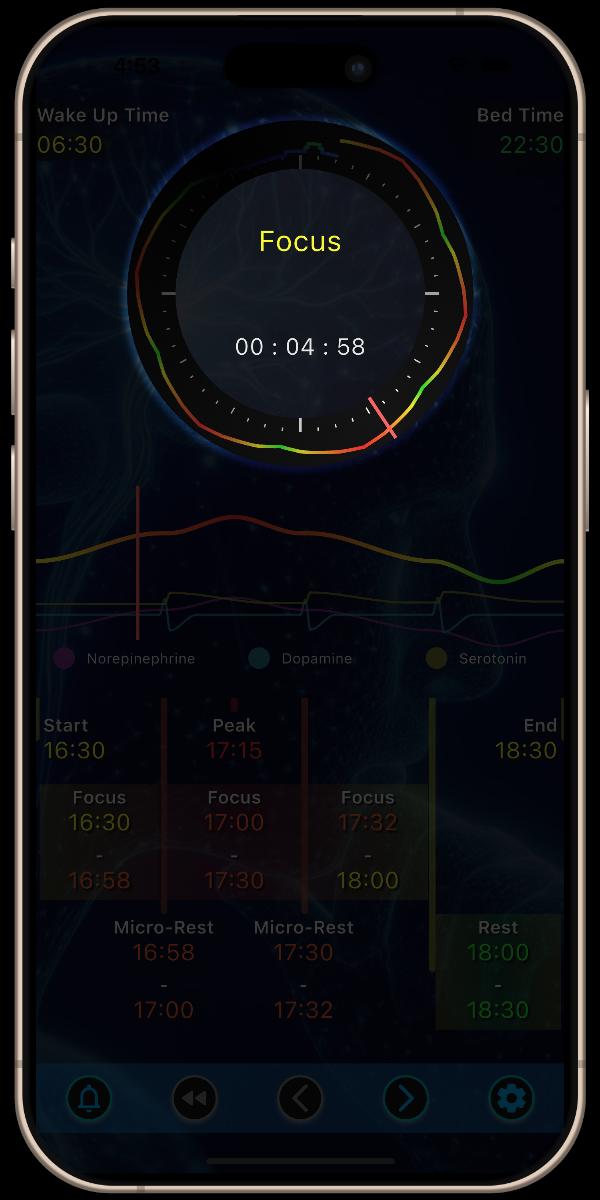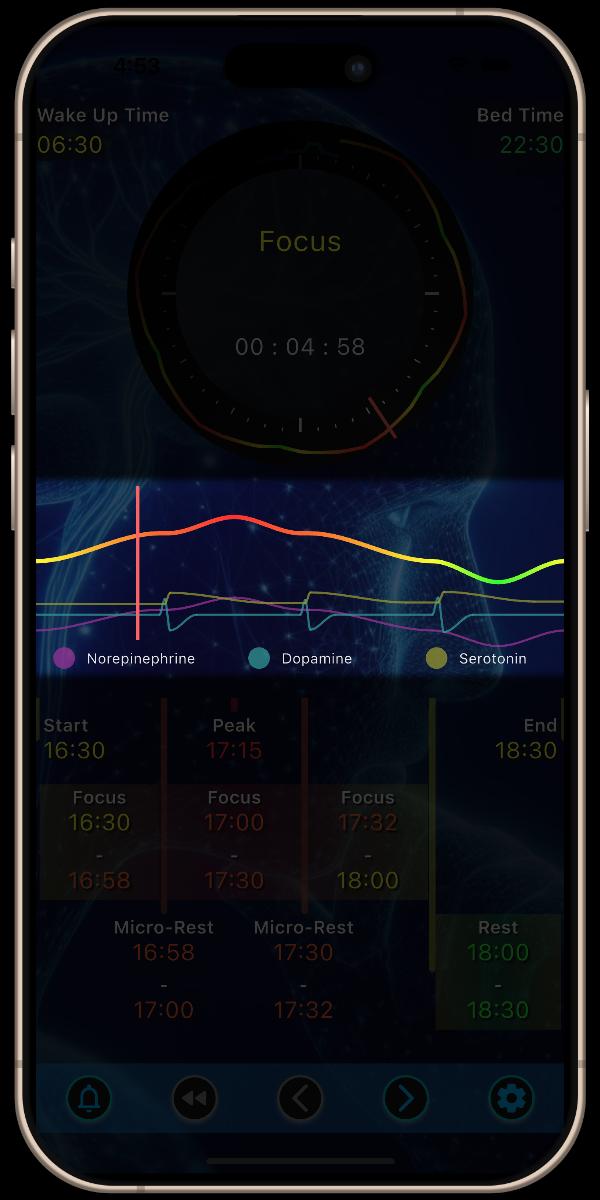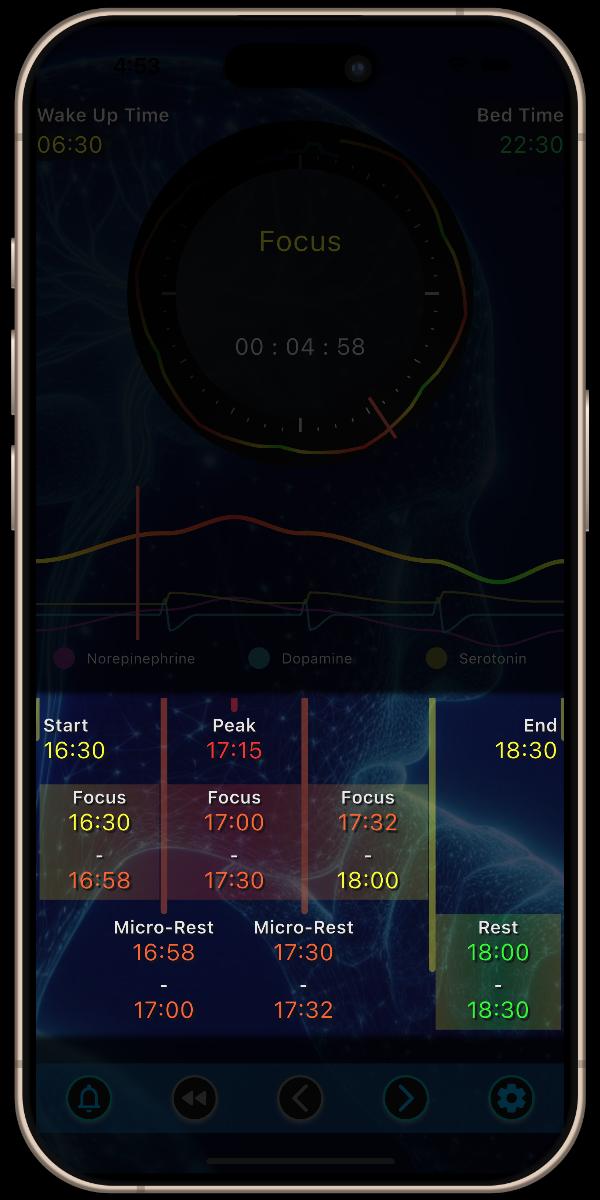Image Gallery
I, like many others, used to have a problem with motivation. It wasn't because I was bored—I love what I do. It also wasn't laziness—I would often skip my main work to do chores like the dishes or laundry. Even when I did manage to psych myself up to sit at my desk, continually maintaining focus was a constant struggle.
Work Smarter, Not Harder. Your Brain Has a Rhythm.
In today’s fast-paced world, the pressure to be constantly productive often leads to burnout and a struggle to maintain focus. We force ourselves to work for hours on end, fighting against our body’s natural cycles. But what if you could work in harmony with your biology, achieving more with less stress?
This app is the first to visualize and guide you through your brain’s natural rhythms, empowering you to unlock your true cognitive potential.
The Science of Sustainable Productivity
Our app is built on a foundation of established neuroscience, not just another time-tracking gimmick. At the heart of our method is the Basic Rest/Activity Cycle (BRAC)—your brain’s natural rhythm of roughly 90 minutes of high alertness followed by a period of mental fatigue. Instead of pushing through the inevitable dip, our app teaches you to work with it.
We also make the invisible visible by showing you the impact of key neurotransmitters—Norepinephrine, Dopamine, and Serotonin. The dynamic ebb and flow of these chemicals is a powerful influence on your overall productivity and well-being throughout the day. Our app helps you work with these natural chemical rhythms instead of against them.
By understanding these powerful internal cycles, you can move from a state of forced productivity to a natural flow state.
Main Screen - Main Clock
The main clock, shows you the hour-hand for the current time.
Surrounding that, is the wave of the cognitive or sleep phase for the current time.
In the centre, you have the name of the current phase, as well as a timer, counting down the time left for the current phase.
Focus
This is your period of deep work and high concentration. During this phase, your neurochemicals are primed to help you engage with your most demanding tasks.
Micro-Rest
This is a short break designed to prevent mental fatigue. During this time, you should focus on physical relaxation, such as stretching and relaxing your muscles, without engaging in new cognitive work.
Rest
This is the restorative phase of your Basic Rest/Activity Cycle (BRAC). Its purpose is to allow your mind and body to fully unwind and recover before the next cycle begins.
Main Screen - Current Phase Waves
This indicates where you are, in the current cycle.
The main wave, is a visual representation, of the current cognitive cycle, showing it's start, peak, end, and rest.
Below the main wave, is the visual representation of the neurotransmitters:
Norepinephrine
Norepinephrine is the key neurotransmitter that governs your alertness and concentration. As a primary driver of your Cognitive Cycle, its levels naturally rise at the start of a productive period, sharpening your focus and preparing your brain for deep work. This allows you to tackle complex tasks with a high degree of attention. The peak of this natural surge is highest at the beginning of your day and gradually reduces with each subsequent cycle. As the cycle progresses, norepinephrine levels gradually fall, leading to mental fatigue and a natural signal that it's time for a rest to restore your cognitive resources.
Dopamine
Dopamine is a key neurotransmitter that drives motivation and reward-seeking behaviors. When you complete a task, a surge of dopamine is released, giving you a quick feeling of pleasure and accomplishment. While this reinforces the productive behavior, the magnitude of the surge tends to decrease throughout the day as your brain adapts to these predictable rewards. After each spike, dopamine levels quickly return to their baseline, ready for the next task.
Serotonin
Serotonin is the key neurotransmitter that influences your mood and feelings of well-being. Unlike the quick surge of dopamine, serotonin is released after you've completed a task and builds up over time. This chemical reduces slowly, meaning that the consistent achievement of tasks throughout the day can lead to a gradual increase in your overall sense of contentment and satisfaction.
Main Screen - Current Phase Timings
This gives you the timings, of all the different phases for the current cycle.
Optimize Your Sleep for Peak Performance
Rest is just as critical as work for your cognitive function. The quality of your sleep directly impacts the next day's BRAC and your ability to maintain focus. This app provides the knowledge and guidance you need to achieve truly restorative sleep.
While we do not track your sleep, our tool helps you understand how sleep cycles work and gives you a framework for determining ideal wake-up times to avoid waking up in the middle of a deep sleep cycle.
By respecting these cycles, you can start each day feeling more refreshed and better prepared for optimal mental performance.
NREM 1 Stage
NREM 1 is the lightest stage of the sleep cycle, marking the crucial transition from being awake to falling asleep. It's a short period where your muscles begin to relax and your breathing slows. Though you may not feel fully asleep, this is the essential gateway that you pass through at the start of each new cycle.
NREM 2 Stage
NREM 2 is a deeper stage of light sleep and the longest stage you spend in each cycle. During this time, your body temperature drops, and your heart rate and breathing become more regular. This is the stage where your brain begins to process and consolidate memories from the day, a critical step toward learning and recall.
NREM 3 Stage
NREM 3 is the deepest and most restorative stage of sleep. During this phase, your body undergoes essential physical repair, strengthens your immune system, and helps to consolidate new memories. This is the stage that makes you feel most rested and refreshed the next morning.
REM Stage
REM sleep is the stage of sleep where most vivid dreaming occurs, and your brain is highly active. During this period, your eyes move rapidly, your breathing and heart rate become irregular, and your muscles are temporarily paralyzed to prevent you from acting out your dreams. This stage is crucial for cognitive functions like emotional regulation and memory consolidation.
A New Approach to Work and Rest
This app is more than a productivity tool; it's a guide to a healthier, more balanced lifestyle. By working with your BRAC and understanding your body’s natural rhythms, you can reduce mental fatigue, enhance your concentration, and cultivate a lasting sense of accomplishment.
Start your journey to working smarter, not harder. Download now and begin to unlock the science of your own brain.
Privacy Policy
This app does not require access or store any personal data. It does use the following 3rd-party services, which have their own Privacy Policies.
The Story Behind
I, like many others, used to have a problem with motivation. It wasn't because I was bored—I love what I do. It also wasn't laziness—I would often skip my main work to do chores like the dishes or laundry. Even when I did manage to psych myself up to sit at my desk, continually maintaining focus was a constant struggle.
So, I found myself looking up articles and videos on motivation. Not the inspirational quotes or stories of others, but more scientific reasoning—both psychological and physiological.
I got right to the core of it—the brain—and started to understand concepts like dopamine and serotonin. Most importantly, it made me aware of the Basic Rest/Activity Cycle (BRAC).
The BRAC is the concept that the brain's activity is never constant, but fluctuates in cycles. We have varying degrees of focus and motivation during these cycles, which begin from the moment we wake up.
This insight set the basis for this app. My idea was that if I kept track of this cycle, I could always plan when to start a task and when to take a break—maximizing my brain's natural activity. So, I created this Cognitive & Sleep Ultradian app.
If you ask me, "Does it work?" I would have to say that it does for me. I've also noticed a few other factors that have added to my productivity, beyond just the neurological ones. There's definitely a psychological advantage as well.
I had previously always given myself a break as a 'reward,' which I'm sure most of you do. That's when you say to yourself, "Finish X amount of things, then you can take a break." And I would sometimes feel guilty when I hadn't completed the task I had set for myself in a certain amount of time.
However, now I just give myself the break when it's my 'Cognitive Rest' period. This allows me to always stay in sync with what's naturally happening in my body.
Interestingly, the goal for the reward shifted from the task itself to the achievement of maintaining focus and remaining productive during my 'Cognitive Peak' phase. The feeling of guilt shifted to a feeling of accomplishment.
~Damien D.


